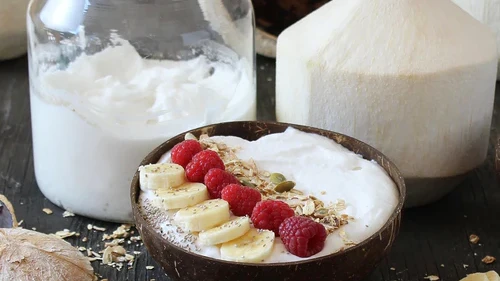Your Cart is Empty

Coconut yogurt made from young drinking coconuts
Barb Hodgens
Barb Hodgens loves to cook with alternative, healthy whole food ingredients, with a focus on gut health. Barb has overcome her own gut health issues through healthy eating. Share your ideas, comments and photos at the end of this post :)

RAW & ADDITIVE FREE COCONUT YOGURT
If you enjoy the benefits of raw food, then you’ll love this method of making coconut yogurt completely from scratch. It’s simply the best way to ensure you have 100% additive-free coconut cream. Nothing compares, quite frankly! Making coconut yogurt from the flesh of fresh young coconuts gives you the added benefit of naturally occurring enzymes that are usually destroyed or altered when exposed to heat during factory processing – I promise you will taste the difference.
You can easily make it at home by buying whole, young drinking coconuts. Don’t let opening a whole coconut daunt you! Watch our demonstration video below - you don't need any special equipment and it becomes easier with practise. But note, don’t get brown coconuts; the matured flesh is too dry for blending into a smooth, yummy, yogurty consistency.
NO THICKENER REQUIRED
Bonus! Homemade coconut cream does not require an added thickener. Our method produces guaranteed thick and fluffy coconut yogurt every time.
STARTER CULTURE
Unlike traditional dairy milk fermentation, there are no specific strains of bacteria required for making coconut yogurt. Basically, any combination of species, from either a yogurt starter culture or a probiotic capsule or powder will repopulate in coconut if the conditions are right. The only three things needed are food (a little bit of sugar), warmth and time.
You can buy Yogourmet non-dairy starter culture here.

FERMENTATION TIME
Fermentation time impacts both the amount of probiotics in your coconut yogurt and the taste. Your coconut yogurt should have a sharp, tangy taste. The longer you ferment your coconut milk the more time the bacteria have to eat the sugar and the more tart it will become.
We recommend up to 24-hour fermentation for our canned coconut yogurt methods, however raw coconut yogurt, is less predictable. After several spoilt batches, I now always ferment for a shorter time. I find 12-15-hours consistently produces perfect, coconut yogurt.
FEED THE BACTERIA SUGAR
In dairy based yogurt production, bacteria in the starter culture eat the milk’s natural sugars, (lactose) during fermentation. Coconut flesh and water, don’t have as much natural sugar available to feed the bacteria and ensure the culturing process will take place. The starter culture (or probiotic) must have plenty to feed on to ensure the culturing process continues for the full duration of the fermentation. One teaspoon of sugar or one tablespoon of pasteurised honey is enough to kick start fermentation. Raw honey may have an antibiotic effect and is therefore not suitable for making yogurt.
OPENING A DRINKING COCONUT
If you haven’t opened a fresh coconut before you are probably wondering how to? This video will demonstrate just how easy it is to do at home without special tools.
PREPARATION
It is recommended that you sterilise your yogurt making jar and utensils beforehand. I have always found it is enough to wash in hot soapy water, then rinse in boiling water.



Coconut yogurt made from young drinking coconuts
Luvele
Rated 5.0 stars by 1 users
If you enjoy the benefits of raw food, then you’ll love this method of making coconut yogurt completely from scratch. It’s simply the best way to ensure you have 100% additive-free coconut cream. Nothing compares, quite frankly! Making coconut yogurt from the flesh of fresh young coconuts gives you the added benefit of naturally occurring enzymes that are usually destroyed or altered when exposed to heat during factory processing – I promise you will taste the difference.
Ingredients
- 4 drinking coconuts
- 1 teaspoon of white sugar or 1 tablespoon of pasteurised honey
- Yogurt starter culture or probiotic powder
Directions
- Use a large serrated knife, (such as a bread knife) to shave off the outer fibre of the coconut creating a circular opening at the top.
Use the pointed edge of a sharp knife to pierce a whole in the hard coconut shell then gauge off the top. Coconut water will spill.
Pour out the water and scoop out the coconut meat. Young coconut meat is soft and gelatinous and easy to scrape out. Use the backside of a soup spoon to guide it out. Depending on the maturity, each coconut will have a different amount of meat. 4 x young coconuts will produce approximately 1 litre of yogurt. Use more coconuts for a larger batch. Note: This coconut yogurt method only requires the water from one coconut. Reserve the remaining coconut water in a sealed glass jar in the fridge; it’s loaded with nutrients and electrolytes. Enjoy drinking it chilled or add it to smoothies. Coconut water will stay fresh for up to 3 weeks stored this way.
Scrape off the bits of brown shell fibre from the coconut meat and rinse it under water if necessary.
Place the water of one coconut and all the coconut flesh into the Vibe blender system and blitz on 'smoothie' mode for 40 seconds or until smooth and creamy.
- Pour the creamed coconut into your yogurt making jar.
Add the yogurt starter culture and sugar/honey then stir to combine.
Put the lid firmly on the glass yogurt jar and place into your yogurt maker. Pour water slowly into the base. The water must not be filled over the ‘tall line’ indicated on the inside wall of the maker. Then place the cover lid on top of the yogurt maker.
The coconut cream is now ready to begin fermentation. Use the digital control panel to set the temperature to 38° C, the time to 15 hours and then press ‘confirm’ to begin incubation.
When complete, place the jar in the fridge for at least 6 hours to set and then enjoy.
Recipe Video
PIN THIS RECIPE

BUY YOUR DAIRY-FREE STARTER CULTURE HERE


Coconut yogurt made from young drinking coconuts

RAW & ADDITIVE FREE COCONUT YOGURT
If you enjoy the benefits of raw food, then you’ll love this method of making coconut yogurt completely from scratch. It’s simply the best way to ensure you have 100% additive-free coconut cream. Nothing compares, quite frankly! Making coconut yogurt from the flesh of fresh young coconuts gives you the added benefit of naturally occurring enzymes that are usually destroyed or altered when exposed to heat during factory processing – I promise you will taste the difference.
You can easily make it at home by buying whole, young drinking coconuts. Don’t let opening a whole coconut daunt you! Watch our demonstration video below - you don't need any special equipment and it becomes easier with practise. But note, don’t get brown coconuts; the matured flesh is too dry for blending into a smooth, yummy, yogurty consistency.
NO THICKENER REQUIRED
Bonus! Homemade coconut cream does not require an added thickener. Our method produces guaranteed thick and fluffy coconut yogurt every time.
STARTER CULTURE
Unlike traditional dairy milk fermentation, there are no specific strains of bacteria required for making coconut yogurt. Basically, any combination of species, from either a yogurt starter culture or a probiotic capsule or powder will repopulate in coconut if the conditions are right. The only three things needed are food (a little bit of sugar), warmth and time.
You can buy Yogourmet non-dairy starter culture here.

FERMENTATION TIME
Fermentation time impacts both the amount of probiotics in your coconut yogurt and the taste. Your coconut yogurt should have a sharp, tangy taste. The longer you ferment your coconut milk the more time the bacteria have to eat the sugar and the more tart it will become.
We recommend up to 24-hour fermentation for our canned coconut yogurt methods, however raw coconut yogurt, is less predictable. After several spoilt batches, I now always ferment for a shorter time. I find 12-15-hours consistently produces perfect, coconut yogurt.
FEED THE BACTERIA SUGAR
In dairy based yogurt production, bacteria in the starter culture eat the milk’s natural sugars, (lactose) during fermentation. Coconut flesh and water, don’t have as much natural sugar available to feed the bacteria and ensure the culturing process will take place. The starter culture (or probiotic) must have plenty to feed on to ensure the culturing process continues for the full duration of the fermentation. One teaspoon of sugar or one tablespoon of pasteurised honey is enough to kick start fermentation. Raw honey may have an antibiotic effect and is therefore not suitable for making yogurt.
OPENING A DRINKING COCONUT
If you haven’t opened a fresh coconut before you are probably wondering how to? This video will demonstrate just how easy it is to do at home without special tools.
PREPARATION
It is recommended that you sterilise your yogurt making jar and utensils beforehand. I have always found it is enough to wash in hot soapy water, then rinse in boiling water.


PIN THIS RECIPE

BUY YOUR DAIRY-FREE STARTER CULTURE HERE


Subscribe
Sign up to get weekly healthy recipes & information on new product releases.
Item is added to cart


